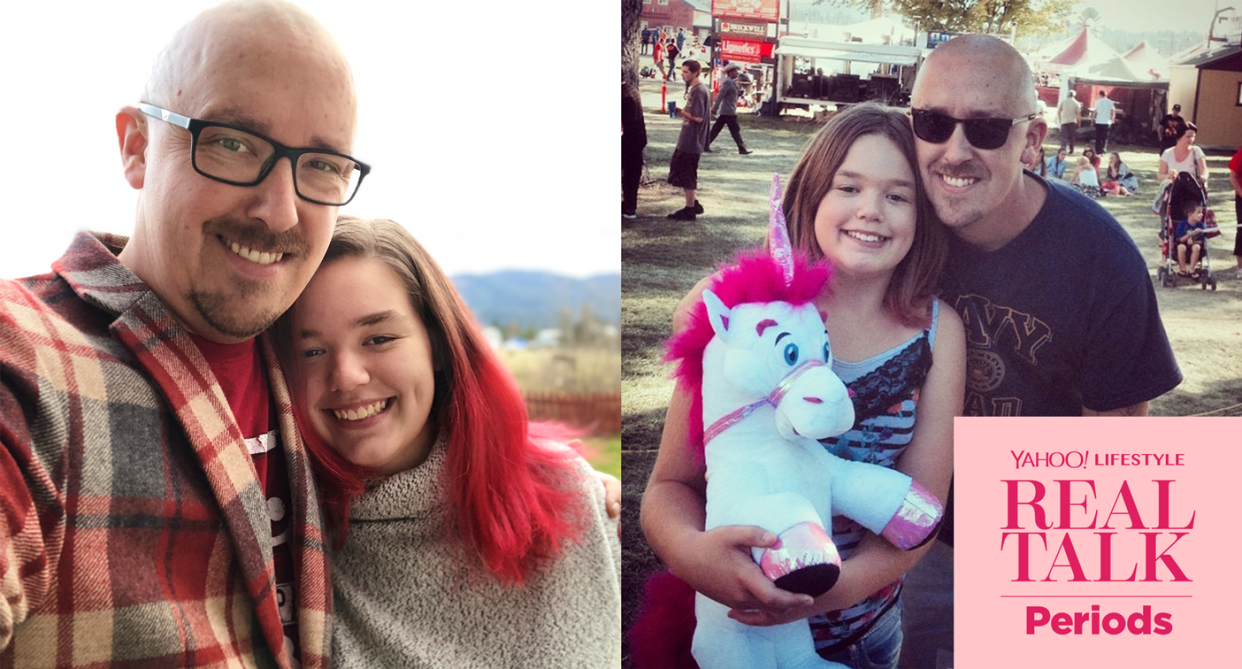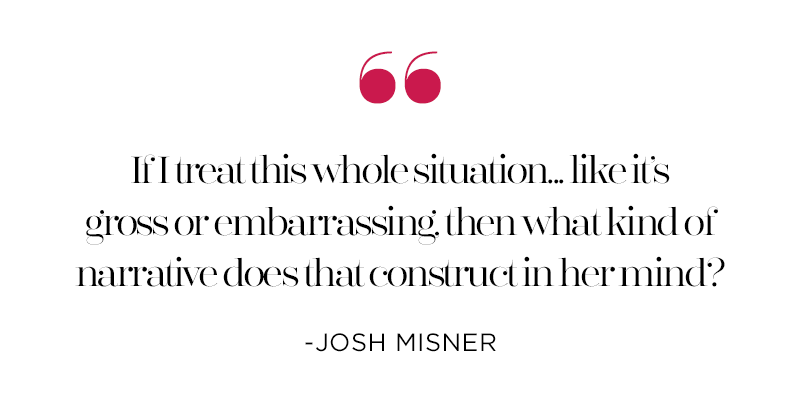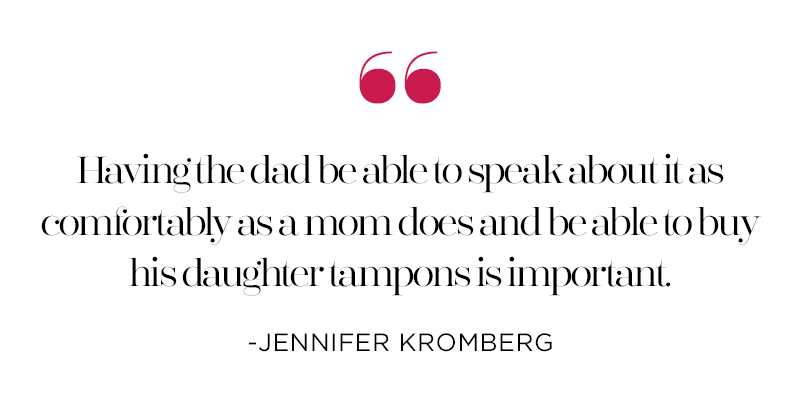Why it's time to break down the 'period stigma' between dads and daughters

When Josh Misner picked up his daughter from school a few years ago, the last thing he expected to get was an invite to an educational session on periods. His then 5th-grader explained that her school was planning to hold a “girls night” and “boys night,” in which the students would return to separate classrooms around 5 p.m. with their respective parents to learn about their changing bodies.
Misner’s daughter wanted him to come hang with the girls.
“It was interesting that she brought it up to me before my wife,” Misner tells Yahoo Lifestyle. “I thought it was because I picked her up from school and she just happened to tell me first.” But when Misner asked his wife if she’d rather take their 11-year-old to learn about menstruation, his wife challenged his assumption. “My wife said, ‘Why don’t you take her? There’s a reason she asked you first.”
Misner, a father of four and a professor of communications, is well-versed in how to conquer difficult topics, but even for him, this felt a bit intimidating. “I was worried I’d be the only guy,” he says. “But then I thought, ‘That’s stupid.’ If my daughter is inviting me to this, I’m going to go,” he tells Yahoo Lifestyle. “She thinks it’s important enough, so I need to treat it as important enough as well.”
So a few days later, Misner went to girls night, wearing — at his daughter’s request, per the PJ-party theme — My Little Pony pajamas from Target. “It was so much more perfect,” he says laughing. “It added to my nervous anticipation.” Aside from one male teacher, Misner was the only man in the room (and, he notes, one of the only people following the pajama theme). “I couldn’t have been more out of place if I tried.”

Although Misner was anxious, he went into it with a plan, one that involved normalizing what society has essentially cast as a taboo topic. “I thought, if I treat this whole situation and all this information she’s about to get on puberty like it’s gross or embarrassing, then what kind of narrative does that construct in her mind?” he says. “Does she suddenly feel like it’s something to be embarrassed about? So I did my best to act like, ‘Hey, this is no big deal. This is just another part of life.’”
Pretty soon, he found that normalizing it with his daughter was working. So when the education session turned into a group game, he decided to do the same thing with the rest of the group. “Some of the women seemed uncomfortable with having me there because it’s not something you discuss with guys,” he says. “So I thought, maybe I need to act like this isn’t a big deal, maybe I don’t need to act embarrassed when I’m asking questions like, ‘How much blood does a girl lose during her period?’”

Misner refrained from talking in whispered tones or from displaying any embarrassment or disgust at the topic discussion. “I thought if I act like it’s no big deal, it gives both them and [my daughter] the freedom to be like — you’re right, it isn’t a big deal,” he says. “And it helps her realize that these changes can be scary, but as long as you keep communicating, then they don’t have to be.”
The experience is one that Misner detailed in a blog post titled The Period Talk I Had With My Daughter. The piece went viral in the mom world, and he still sees it reposted years later. California-based psychologist Jennifer Kromberg isn’t surprised. She says it’s crucial that fathers play an “equally important” role in their daughters’ lives.
“Since it’s the opposite-sex parent, the relationship between the father and the daughter creates a dynamic that is often replicated in a woman’s life,” Kromberg tells Yahoo Lifestyle. “Relationship patterns become imprinted in our brains. So if a daughter’s relationship with her dad is established as loving and open and real, she may be more likely to look for that in any men she meets.”
An important part of that realness, she says, is discussing things like periods. “Having a father who understands what happens during her period, and doesn’t treat it like it’s weird, makes a woman feel less weird about it herself,” says Kromberg. “And as she grows, if she dates men, she learns to expect that same treatment. It helps establish expectations.”
That’s not to say Kromberg doesn’t understand why it can be difficult or awkward to have these conversations. “We’re not raised in a society that considers our breasts and vaginas normal things to discuss, [even though they’re] normal parts of our bodies,” Kromberg says. “But that mentality has contributed to the idea that we have to hide when we’re on our period. It’s nothing to be embarrassed about; it’s a natural bodily function.”

Kromberg agrees that getting fathers onboard can be huge for a girl’s self esteem. “Having the dad be able to speak about it as comfortably as a mom does, and be able to buy his daughter tampons is important,” says Kromberg. “If the dad can make it seem normal — as normal as taking math tests, or going to the dentist, then I think that helps his daughter have that type of attitude towards her body.”
Misner realizes that, for many men reading this, it may seem like a tough task. But he urges dads everywhere to try breaking the ice. “I get it, it’s scary,” he says. “Anytime we’re uncertain about things, it produces a lot of anxiety, so for a lot of men who are unfamiliar with this, it can create that fear. But it’s not complicated. … I just think it’s worthy of taking a minute to learn about this a little bit more to become more open about it because it can only make the relationships we have with our mothers, wives, sisters, daughters, and granddaughters better.”
After the period talk at his daughter’s school, Misner’s wife — by chance — texted him that she was in need of some tampons. It wasn’t the first time he’d had to purchase a box for her, but this time it felt different. “I set them down on the counter and I’m looking at them and thinking: Why are people so embarrassed about this? How is this any different than buying toilet paper?” he says. “Any guy that is too embarrassed to go to the store and buy tampons for whatever women he has in his household is a guy that doesn’t deserve those women in his life.”
When the cashier asked if Misner wanted a bag for the sole box of tampons, he said no. “Watching my daughter throughout that whole interaction, I think it really framed her perception of herself,” he tells Yahoo Lifestyle. “To this day, four years later, she’s never had a problem coming to me and talking to me about anything. We have a very open relationship as father and daughter, and I love that. I love knowing that little situations like this are what cultivated it.”
Read more from Yahoo Lifestyle:
‘There is an air of shame’: Why are periods still a taboo topic?
How the Rock and other celebrity dads are embracing fatherhood and breaking down gender stereotypes
‘Hopelessly submerged in pain for days’: What it’s like to live with menstrual migraines
Follow us on Instagram, Facebook, and Twitter for nonstop inspiration delivered fresh to your feed, every day.
